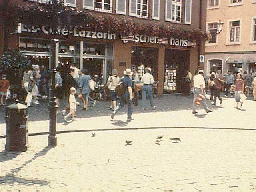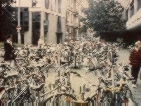

Freiburg: This city is far removed from Berlin. It is in the extreme southwest of Germany, just north of Basel, Switzerland. The mentality is very different from Berlin. Berlin is tough and vital and gutsy, a worker's city, and a cosmopolitan city par excellence. Freiburg on the other hand, is provincial and relaxed and charming, relying on its famous university for its claim to world-wide importance and sophistication.

You take a long lunch, walk the streets, shop in boutiques, sit in a cafe. If you travel, it is to Milan or Paris. Berlin is at the other end of the universe as far as Freiburger's are concerned. They couldn't care less,and aren't straining to worry about the integration of the two Germanies. slide? Freiburg is living the good life at its best. Unemployment is low, there are no polluting industries, the air is even good by German standards. There is a lot of environmental concern here, and lots of nice things to do in your leisure time, like mountain biking, skiing in the winter, swimming in Black Forest lakes, and hiking on trails.
 Here we are at the university,where bikes are a favorite mode of transportation for students. A beginning teacher in Freiburg makes about $40,000, experienced teachers $50,000 to $60,000 a year here, the professors at the University make more. Most professionals have houses or apartments that they own or rent. Housing is expensive. Freiburgers enjoy all the usual benefits that Germans have. Health care is a given: You fill out a form, and that's it. Women get six weeks leave with full pay after they have a child. If both parents work, and one wishes to stay at home to raise a child, or children, there is a payment provision for that purpose. There are tax breaks for children, too. Almost everyone has six or eight weeks paid vacation. Annual trips to faraway places are commonplace.
Here we are at the university,where bikes are a favorite mode of transportation for students. A beginning teacher in Freiburg makes about $40,000, experienced teachers $50,000 to $60,000 a year here, the professors at the University make more. Most professionals have houses or apartments that they own or rent. Housing is expensive. Freiburgers enjoy all the usual benefits that Germans have. Health care is a given: You fill out a form, and that's it. Women get six weeks leave with full pay after they have a child. If both parents work, and one wishes to stay at home to raise a child, or children, there is a payment provision for that purpose. There are tax breaks for children, too. Almost everyone has six or eight weeks paid vacation. Annual trips to faraway places are commonplace.
 The harsh part of the German past is not of interest here. It is as if the Freiburgers have no sense of responsibility about the East, and are turning their backs on the important developments of their national history. There seems to be little awareness that it is merely by accident of being born in the West, that things are going very well for them. The student graffiti here says, Kauft nichts!, Don't buy anything! but the whole town is out shopping like crazy. I am, therefore I consume, seems to be the motto here, and applies all day long.
The harsh part of the German past is not of interest here. It is as if the Freiburgers have no sense of responsibility about the East, and are turning their backs on the important developments of their national history. There seems to be little awareness that it is merely by accident of being born in the West, that things are going very well for them. The student graffiti here says, Kauft nichts!, Don't buy anything! but the whole town is out shopping like crazy. I am, therefore I consume, seems to be the motto here, and applies all day long.
 Housing here in Freiburg is either new or newly renovated. There is no building that is in bad shape. The old city has been completely restored. Modern businesses exist in shops that date from Medieval or Renaissance times. No one needs housing. There seems to be no under-class. I saw a few homeless persons in Germany, just one in Freiburg. There are probably several in this city, which is the size of Santa Rosa. I saw one man, the same person, on half-a-dozen occasions,who panhandled in Freiburg. He's doing this, according to the official (picture at left) at the employment office, the Arbeitsamt, because he wants to. If anyone wants or needs housing, they simply have to apply. There are shelters,and eventually, even apartments and houses for such people. Some cities, like Frankfurt and Berlin have many homeless, but the figure is far less proportionally than in the U.S.
Housing here in Freiburg is either new or newly renovated. There is no building that is in bad shape. The old city has been completely restored. Modern businesses exist in shops that date from Medieval or Renaissance times. No one needs housing. There seems to be no under-class. I saw a few homeless persons in Germany, just one in Freiburg. There are probably several in this city, which is the size of Santa Rosa. I saw one man, the same person, on half-a-dozen occasions,who panhandled in Freiburg. He's doing this, according to the official (picture at left) at the employment office, the Arbeitsamt, because he wants to. If anyone wants or needs housing, they simply have to apply. There are shelters,and eventually, even apartments and houses for such people. Some cities, like Frankfurt and Berlin have many homeless, but the figure is far less proportionally than in the U.S.
I attended a seminar here in Freiburg, where we studied in some detail the process of integration of the two Germanies. One of our tasks was to visit the employment office,which we did. Here we interviewed an official, who described to us the employment situation in Freiburg. Unemployment is not very high, about nine percent. There are many benefits for those who lose their jobs. Recession has hit Germany. Plants do indeed shut down, but this area has not been awfully hard hit. The worst unemployment is not here, but in the north and in the east. One plant employing about 800 workers shutdown in the period that I was in Freiburg. What happens to these people? Will they get other employment? Most will, eventually. In the interim, they will get unemployment insurance, which is one of the chief functions of the Arbeitsamt.
All employees (except professional civil servants), are subject to obligatory insurance. Unemployment benefits can be as much as 68% of the last net pay. As a rule it is paid for a maximum period of one year, in the case of older unemployed people it is paid for up to thirty-two months. Thereafter anyone who is still unemployed can apply for"unemployment support", which can be up to 58% of the net wage or salary. TheArbeitsamt also pays benefits to employees on short time or those unable to work during the cold winter months (e.g. construction workers). In some cases, a worker's rent or mortgage is paid for some time as well, insuring him/her of adequate housing or at least of not losing existing housing. Retraining is also one of the responsibilities of theArbeitsamt.
When workers retire, they receive a very adequate pension. The statutory pension insurance plan is one of the central pillars of social security in the Bundesrepublik,it ensures that workers will not suffer financial need and are able to maintain an adequate standard of living in retirement. Pensions in the new states are to increase on an annual basis in line with the wages of the working population there. The aim is to bring East Germany pensions up to the level of West German pensions as soon as possible.
Proceed to Part 3: Jena and Environs: Workin East Germany or, switch to another Part:
1. Berlin and Environs
2. Freiburg: Living the Good Life - Top of this page
4. The Klemms: an East German family
5. Building, Housing and Work in Jena
6. Kahla, an East German Success Story
7. Buchenwald and Beyond: The continuing legacy of the Holocaust
8. Duisburg: The East-West Unification Blues